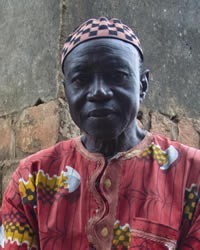Dyula in Ghana

Photo Source:
Alfonso Castellanos - Wikimedia
Creative Commons
|
Send Joshua Project a map of this people group.
|
| People Name: | Dyula |
| Country: | Ghana |
| 10/40 Window: | No |
| Population: | 93,000 |
| World Population: | 4,937,000 |
| Primary Language: | Jula |
| Primary Religion: | Islam |
| Christian Adherents: | 0.00 % |
| Evangelicals: | 0.00 % |
| Scripture: | Complete Bible |
| Ministry Resources: | Yes |
| Jesus Film: | Yes |
| Audio Recordings: | Yes |
| People Cluster: | Manding |
| Affinity Bloc: | Sub-Saharan Peoples |
| Progress Level: |
|
Introduction / History
The name jula means "itinerant trader," and the Jula (AKA, Dyula) people are still well respected for their trading abilities. The trading posts established by the Dyula for hundreds of years eventually morphed into market villages and cities. They have left their mark on West African history and economy. The Dyula are the descendants of the Malinke (Mandingo), inheritors of the ancient Mali empire. Situated between the Arab world to the north and the black African nations to the south, Mali has always been the cultural crossroads of western Africa. The result is a cultural mix that the Dyula contribute to through their music, dance and beautiful jewelry. By the time the Mali Empire was at its peak in the 1300s, the Dyula had made Mali their trade base for West Africa. They traded gold, millet, slaves, cola nuts and anything else of value. Later, the Maninka rulers of Mali began spreading Islam throughout the African plains, and the Dyula became strong converts. Today most live along the trade routes of West Africa. Dyula clans have settled in Cote d'Ivoire, Ghana, Burkina Faso, Guinea-Bissau and Mali. The Dyula speak Jula, a Mande language that belongs to the Nilo-Congo language family.
What Are Their Lives Like?
The Dyula began settling in towns during the 1500s. Some founded their own independent villages; others chose to settle in larger towns for greater commercial opportunities. As a result, most Dyula communities became politically subservient to the kings and chiefs of other ethnic groups. As merchants, it often benefited them to maintain good relationships with their neighbors.
Dyula society is hierarchical and caste based. They live in clans, and the clan is the most important aspect of their lives. The people are fiercely loyal to their clans, proudly defending them. They express their history and devotion through the traditions of dance and storytelling. The father is the head of the family and inheritances are passed down from fathers to their sons. Older males possess the most power and influence.
Among the Dyula, there is generally a division of labor according to gender. Weaving, fighting, and studying Islam were traditionally male activities; while, spinning, cooking and tending to the children were the responsibilities of the women. However, both men and women engaged in trade.
The Dyula still practice polygamy (multiple spouses) and youths are encouraged to marry within their own clans. They prefer marriages between cousins. Girls usually marry at age 16. Nearly half of the population is under the age of 15 and few live beyond age 45. Therefore, the Dyula have great respect for the elderly, especially if a man is an Islamic scholar. The fundamental moral principles of the Dyula include obedience, honesty and dedication to their people. Such precepts are motivated by a sense of human dignity.
What Are Their Beliefs?
Over 80 percent of Dyula are Sunni Muslim. Most of the others, whom the Muslims call pagans, hold traditional animistic beliefs (believe that non-living objects have spirits). West African Islam does, however, generally retains local animistic traditions.
The Dyula people hold Muslim scholars in high esteem. They are responsible for educating the people in the teachings of the Koran. Islamic religious beliefs share several similarities with Christianity: the belief in one God who is eternal, creator, omniscient; the existence of protecting spirits (or angels); the concept of the sanctuary or the holy of holies; and they even have a belief in the second coming of Jesus.
What Are Their Needs?
The complete Bible has been translated into their language. There is a need for more workers to take Bibles and culturally appropriate worship music to the Dyula people.
Prayer Points
Pray for the Lord to bless the Dyula people of Ghana as a testimony of his goodness and power.
Pray for good fruit to come from efforts to take Christ to the Dyula people.
Pray for spiritual openness among the Dyula people in Ghana.
Pray for a movement to Christ among the Dyula people.